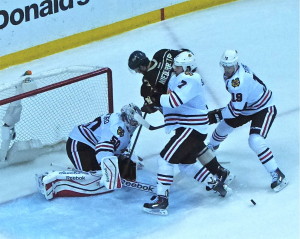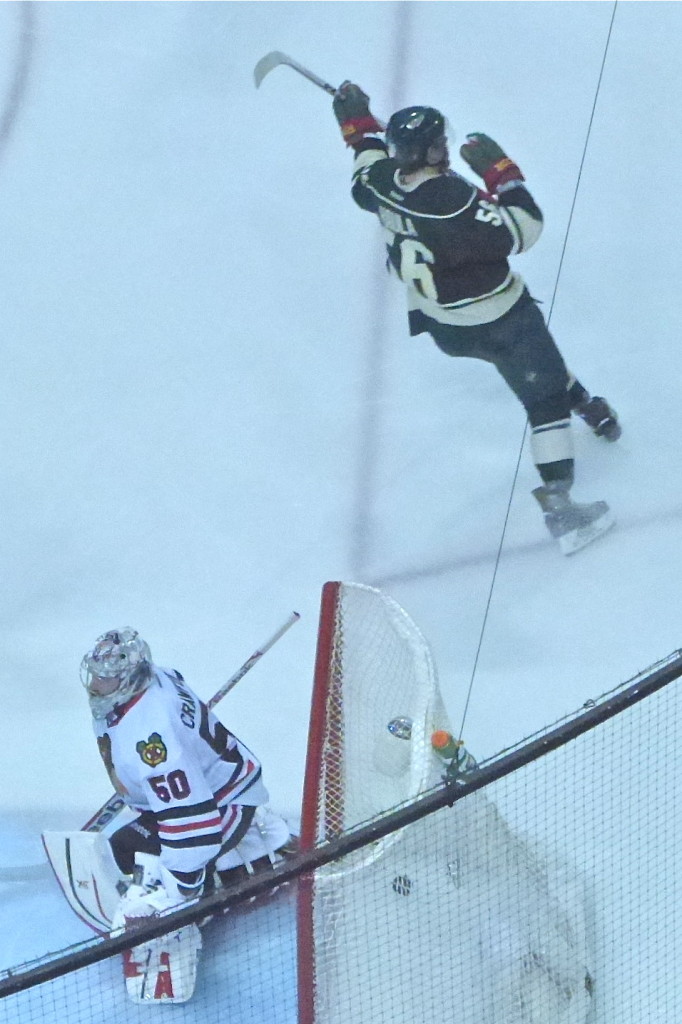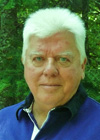Wild Emerge in Position to Join NHL Elite
By John Gilbert
The easy part, for the Chicago Blackhawks, was returning home to Chicago for a few relaxing days of practice and then the opening two games of the Western Conference final Stanley Cup Playoff series against the Los Angeles Kings.
The much more difficult part was for the Minnesota Wild to wake up last Wednesday morning and realize they didn’t have to go practice and prepare to fly to Chicago for Game 7. There would be no Game 7; the Wild season had ended, cruelly, on Patrick Kane’s overtime winner after an absurd bounce off the end boards popped the puck out front.

Brent Seabrook and Jonathan Toews couldn’t prevent Wild rookie Nico Niederreiter from getting to goalie Corey Crawford.
The goal, and the season-ending result, resonated with the Wild, with their 19,396 fans at Xcel Center, their vast television audience, and with the Chicago Blackhawks — who were outshot 35-27 in the game, and outhit 20-12, but they were not outscored, or outlucked.
“We got a very fortunate bounce, and it went to the right player, Patrick Kane,” said Chicago assistant general manager Norm Maciver. “Of course, you’ve got to be good enough to put yourself in position to capitalize on a chance like that, but he’s a special player.
“The funny thing is that he’s scored some amazing shootout goals, but this year, he is 0-for-11 in shootouts. For Patrick, this was better, because he had less time to think. When things are at full speed, the game is too fast for most players but it slows down for him. I think 99 percent of all NHL players would have just put it on net with that loose puck. But Patrick has that combination of patience, composure and skill.”
But mostly, Maciver wanted to give full credit to the Wild. “They have a terrific young team,” he said. “They are not the same as what we faced last year. Even in the first game, the score was not indicative of how close the game was. It was a hard-fought series and the Wild played exceptionally well. If Corey Crawford had not played so well for us in goal, it could have been a lot different. The last game could have been a 4-0 win for the Wild if he hadn’t been so sharp.”
Comparing the first two goals of the game was an indication: Less than 2 minutes into the game, Chicago’s Kris Versteeg spun free of Keith Ballard in the right corner and flipped the puck toward the crease. It hit a player, maybe two or three players, and went in. “It took a crazy bounce, I don’t know how it went in,” said Bryzgalov.
In the second period, Wild defenseman Clayton Stoner got the puck deep in the Wild zone and flipped it up the boards. Matt Cook, who has absorbed more criticism for his uncompromising forcefulness than praise for his outstanding play, got the puck with his back to the point man, and chipped a perfect backhand pass off the side boards and out across center ice. Erik Haula, at full flight, shifted to a higher gear to get to the puck and get past the defense, and beat Crawford on the breakaway.
The team that knows how to win and has won so much found the way to get a “lucky” goal; the team that is just learning to win and has to work hard for its goals, equalized it with a great goal. It stayed 1-1 until overtime, and then the lights went out. Literally.
“We’re kinda in shock,” said Zach Parise. “The whole building is in shock. We had some breakaways, but we couldn’t convert. We did grow a lot, and came together to see how hard you’ve got to work to get past this level.”
The toughest post-game talk of coach Mike Yeo’s life followed, and he handled it so smoothly you could barely discern the turmoil he was feeling inside in those emotional minutes.
“It hurts to lose,” Yeo said. “We really believed we could do it, and the guys did everything we asked. They laid it on the line. Makes me realize what this group is made of. Congratulations to the Blackhawks; that’s as close as you’re going to come to a dynasty.”
Maciver expressed praise for Yeo and his staff. “People like to talk about our great forwards and our scoring,” said Maciver, a former UMD star and Duluth resident. “But the key to our team is how our defensemen get involved in transition play and in the offensive zone. During the season, coaches focus on their own team, how it’s playing and how it’s improving. But in a playoff series, you have enough time to focus on the other team and try to stop them. Mike Yeo and his staff came up with a great game plan, and got their players to buy into it, and they pretty much took our defensemen out of the play.
“They made it extremely difficult, and we could very well have been heading home for a Game 7. We came into this series as the team with the second highest shots on goal, and in goal differential, and the Wild outshot us, probably in all six games.”
Back on the Xcel Center’s podium microphone, Yeo said: “It’s really hard to win in this league, and it takes more than talent. You have to always keep working, keep building. We had great leadership on this team from our veteran players, and in the playoffs, our young players improved so much — but I credit our veterans for having a huge part in that improvement.”
With his own contract status still unsettled, Yeo — who more than proved his capabilities and impressed all but a few hypercritical columnists — continued to mask the emotion of the moment with the necessity for concrete planning for the future. “It never ends, and you’ve got to keep working,” Yeo said. “The way our young kids performed, battling through an incredible amount, but paying the price physically, mentally and emotionally, I think the best thing we’ve done is we’ve created a culture. An identity. An attitude.”



 John Gilbert is a lifetime Minnesotan and career journalist, specializing in cars and sports during and since spending 30 years at the Minneapolis Tribune, now the Star Tribune. More recently, he has continued translating the high-tech world of autos and sharing his passionate insights as a freelance writer/photographer/broadcaster. A member of the prestigious North American Car and Truck of the Year jury since 1993. John can be heard Monday-Friday from 9-11am on 610 KDAL(www.kdal610.com) on the "John Gilbert Show," and writes a column in the Duluth Reader.
John Gilbert is a lifetime Minnesotan and career journalist, specializing in cars and sports during and since spending 30 years at the Minneapolis Tribune, now the Star Tribune. More recently, he has continued translating the high-tech world of autos and sharing his passionate insights as a freelance writer/photographer/broadcaster. A member of the prestigious North American Car and Truck of the Year jury since 1993. John can be heard Monday-Friday from 9-11am on 610 KDAL(www.kdal610.com) on the "John Gilbert Show," and writes a column in the Duluth Reader.